Tomato Nutrition Facts
Tomato Nutrition Facts
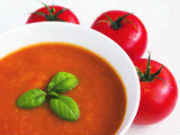 Tomatoes are one of the foods that we eat the most, probably on a daily basis in one form or another. Whether it's on a burger, part of a salsa or in sauces and gravys. Alhough they may not compare to the asparagus in terms of being loaded with nutrients and being nitritionally well-balanced, tomatoes are a good source of Vitamin A and an excellent source of Vitamin C.
Tomatoes are one of the foods that we eat the most, probably on a daily basis in one form or another. Whether it's on a burger, part of a salsa or in sauces and gravys. Alhough they may not compare to the asparagus in terms of being loaded with nutrients and being nitritionally well-balanced, tomatoes are a good source of Vitamin A and an excellent source of Vitamin C.
One medium tomato contains 20% of the recommended daily allowance (RDA) of Vitamin A, and 40% of the RDA for Vitamin C. Fresh tomatoes are also very rich in potassium. So what do these two vitamins and potassium do for your system?
Vitamin A is needed by our bodies to help promote healthy body tissue. It also helps to keep off infections especilaly in the mucuous membrane and to aid in the development of healthy teeth and bones. Vitamin A helps to keep the skin moist thereby preventing the formation of rough, hard skin. Another important health benefit we get from Vitamin A is the maintenance of healthy eyes. Those who are Vitamin A deficient develop night blindness amongst many other things such as acne and eyeball pain.
 Vitamin C as most of us already know help to boost our immune system and help our bodies to fight against infections that may want to attack our bodies. It is also important in the formation of collagen which is an essential substance for the whole body. The abnormal functioning of collagen can cause aging, gout, inflammation of the blood vessels and muscular pain amongst a few other things. A good dose of Vitamin C helps to lower cholesterol levels in the blood and is a great antidote for neutralizing free radicals that will cause premature aging. Other sources of vitamin C include strawberries, broccoli, pineapples, watermelon, papaya, oranges and other citrus fruits. Raw and cooked leafy green vegetables such as spinach are also a good source of Vitamin C.
Vitamin C as most of us already know help to boost our immune system and help our bodies to fight against infections that may want to attack our bodies. It is also important in the formation of collagen which is an essential substance for the whole body. The abnormal functioning of collagen can cause aging, gout, inflammation of the blood vessels and muscular pain amongst a few other things. A good dose of Vitamin C helps to lower cholesterol levels in the blood and is a great antidote for neutralizing free radicals that will cause premature aging. Other sources of vitamin C include strawberries, broccoli, pineapples, watermelon, papaya, oranges and other citrus fruits. Raw and cooked leafy green vegetables such as spinach are also a good source of Vitamin C.
Potassium acts as an electrolyte in our bodies. It's also required for keeping our heart, brain, kidney, muscle tissues and other important organs in good condition. A deficiency in potassium may lead to symptoms like fatigue and weakness in muscles. Other indications for potassium deficiency include inactive reflexes, abnormal heartbeat, heart palpitations, anemia and severe headaches. The individual may also experience pain in the intestines, swelling in glands, become hypertensive or diabetic as serious effects of this deficiency. Bananas are another great source of potassium so you can also add them to your diet.
Tomato Nutrition Facts and Weight Loss
 It's amazing that such a small, humble vegetable can aid one in losing weight. Research has shown that tomatoes are rich in compounds that alter the levels of appetite hormones. This makes them a simple and inexpensive way to keep those hunger pangs at bay.
It's amazing that such a small, humble vegetable can aid one in losing weight. Research has shown that tomatoes are rich in compounds that alter the levels of appetite hormones. This makes them a simple and inexpensive way to keep those hunger pangs at bay.
Tomatoes are very low in calories and sugars which makes them a good vegetable to add to your healthy eating diet for weight loss. You can incorporate them into your diet in many different ways such as putting it on a sandwich together with carrots which are also said to help with weight loss. Bananas are another one of the fruits that you can include in your weight loss program.
Tomato Nutrition Facts and Cancer
 Some red fruits and vegetables are colored by natural pigments called lycopenes and some anthocyanins. Tomatoes are colored by the pigment lycopene. In fact, they are said to be one of the best sources of lycopene.
Some red fruits and vegetables are colored by natural pigments called lycopenes and some anthocyanins. Tomatoes are colored by the pigment lycopene. In fact, they are said to be one of the best sources of lycopene.
Lab tests have shown that lycopene is twice as powerful as beta-carotene at neutralizing free radicals. Studies have also shown that lycopene protects the skin from damage by ultra violet rays. It is this pigment that research has found to reduce the risk of several types of cancer such as lung, stomach, pancreatic, breast, cervical, colorectal, oral, esophageal and prostate cancers.
Prostate, lung and stomach cancers are especially three types of cancer that tomatoes help to reduce the risk of. Eating tomatoes and tomato products may help men reduce the risk of prostate cancer. All forms of tomato whether they are raw, in ketchup, spaghetti sauce, tomato paste, soup, or salsa have a beneficial effect. However, tomatoes cooked in oil, such as in tomato sauce, appear to be the most protective.
We will now take a look at the nutrition facts of a few tomato varieties. The daily value percentages are based on a 2,000 calories diet. Your values may be higher or lower depending on your calorie needs.
Grape Tomato Nutrition Facts
These have been a more recent introduction. They are smaller and oblong, a variation on plum tomatoes, and used in salads. Grape tomato nutrition facts reveal that they are an excellent source of Vitamin C which is vital for our bodies, to help fight against infections, amongst other things. Grape tomatoes are low in calories and do not contain any fat or sodium.
- Serving size- 3oz (85g, approximately 12 tomatoes)
- Calories- 25
- Calories from Fat- 0
- Total Fat- 0g
- Saturated Fat- 0g<
- Cholesterol- 0mg
- Sodium- 0mg
- Total Carbohydrates- 6g, 2% of DV
- Dietary Fiber- 0g
- Sugars- 3g
- Protein- 0g
- Vitamin A- 8% of DV
- Calcium- 0% of DV
- Vitamin C- 40% of DV
- Iron- 2% of DV

Canned Tomato Nutrtition Facts
Nutrition facts on canned tomato shows us that it is very low in Saturated Fat and Cholesterol. It is also a good source of Dietary Fiber, Vitamin A, Vitamin E (Alpha Tocopherol), Vitamin K, Thiamin, Niacin, Calcium, Magnesium and Manganese, and a very good source of Vitamin C, Iron, Potassium and Copper. The negative thing is that these canned tomatoes are very high in Sodium, and a large portion of the calories come from sugars.
- Serving size- 255g
- Calories- 66
- Calories from Fat- 4
- Total Fat- 0g
- Saturated Fat- 0g
- Trans Fat -
- Cholesterol- 0mg
- Sodium- 563mg, 23% of DV
- Total Carbohydrates- 16g, 5% of DV
- Dietary Fiber- 3g, 12% of DV
- Sugars- 9g
- Protein- 2g
- Vitamin A- 9% of DV
- Vitamin C- 34% of DV
- Calcium- 9% of DV
- Iron- 19% of DV
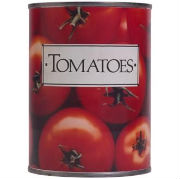
Sliced Tomato Nutrition Facts
Sliced tomatoes are more commonly used in sandwiches and burgers. As we can see, they are also low in calories and sodium. There is no fat or cholesterol content in tomatoes.
- Serving size- 1 slice (15g)
- Calories- 3
- Calories from Fat- 0
- Total Fat- 0g
- Saturated Fat- 0g
- Cholesterol- 0mg
- Sodium- 0.8mg, 0% of DV
- Potassium- 35.6mg, 1% of DV
- Total Carbohydrates- 0.6g, 0% of DV
- Dietary Fiber- 0.2g, 0% of DV
- Sugars- 0.4g, 0% of DV
- Protein- 0.1g
- Vitamin A- 2% of DV
- Vitamin C- 3% of DV
- Iron- 0% of DV
- Calcium- 0% of DV

Green Tomato Nutrition Facts
Nutrition facts on green tomatoes show us that they are an excellent source of Vitamin C, providing you with a whooping 70% of your recommended daily allowance. They are also a good source of Vitamin A, and a source of Dietary Fiber. Here we can see that green tomatoes have a good does of potassium, which has been said to be a possible stroke preventer.
- Serving size- 1 cup
- Calories- 42
- Calories from Fat- 3
- Total Fat- 0.36g, 1% of DV
- Saturated Fat- 0.05g, 0% of DV
- Polyunsaturated Fat- 0.15g
- Monounsaturated Fat- 0.05g
- Cholesterol- 0mg
- Sodium- 23mg, 1% of DV
- Potassium- 367mg
- Total Carbohydrates- 9.18g, 3% of DV
- Dietary Fiber- 2g, 8% of DV
- Sugars- 7.2g
- Protein- 2.16g
- Vitamin A- 23% of DV
- Vitamin C- 70% of DV
- Calcium- 2% of DV
- Iron- 5% of DV
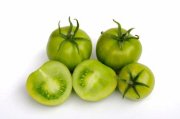
Sun Dried Tomato Nutrition Facts
Sun dried tomato nutrition facts show us that they are low in Saturated Fat, and very low in Cholesterol. It is also a good source of Dietary Fiber, Thiamin, Riboflavin, Niacin, Iron, Magnesium and Phosphorus, and a very good source of Vitamin C, Vitamin K, Potassium, Copper and Manganese.
As we can see, sun dried tomatoes contain a whooping 89% of your recommended daily allowance. Remember to keep your sodium intake in check. As we have discussed in many other articles, too much sodium in one's diet may cause hypertension amongst other things.
- Serving size- 100g
- Calories- 258
- Calories from Fat- 25
- Total Fat- 3g, 5% of DV
- Saturated Fat- 2% of DV
- Cholesterol- 0mg
- Sodium- 2095mg, 87% of DVV
- Total Carbohydrates- 56g, 19% of DV
- Dietary Fiber- 12g, 49% of DV
- Sugars- 38g
- Protein- 14g
- Vitamin A- 17% of DV
- Vitamin C- 65% of DV
- Iron- 50% of DV
- Vitamin K- 54% of DV
- Thiamin- 35% of DV
- Riboflavin- 29% of DV
- Niacin- 45% of DV
- Vitamin B6 and Folate- 17% each of DV
- Pantothenic Acid- 21% of DV

Roma Tomato Nutrition Facts
When considering roma tomatoes and their nutrition facts, we realize that they are a good source of Vitamin A, and an excellent source of Vitamin C. They are also low in calories, sodium and fat.
- Serving size- 1 medium size (148g)
- Calories- 35
- Calories from Fat- 0
- Total Fat- 1g, 1% of DV
- Cholesterol- 0mg
- Sodium- 5mg, 0.2% of DV
- Total Carbohydrates- 7g, 2% of DV
- Dietary Fiber- 1g, 4% of DV
- Sugars- 6g
- Protein- 1g
- Vitamin A- 20%
- Vitamin C- 40% of DV
- Calcium- 2%
- Iron- 2%
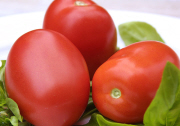
Sweet Grape Tomato Nutrition Facts
Once again sweet grape tomato nutrition facts show us that they are low in calories, very low. Contain no fat or cholesterol and are also very low in sodium. They are a good source of Vitamin A which promotes the good health of your eyes, and Vitamin C which boosts your immune system.
- Serving size- 85g (about 8 tomatoes)
- Servings per container- 3
- Calories- 15
- Calories from Fat- 0
- Total Fat- 0g
- Saturated fat- 0g
- Trans Fat- 0g
- Cholesterol- 0mg
- Sodium- 10mg, 0.4% of DV
- Total Carbohydrates- 3g, 1% of DV
- Dietary Fiber- less than 1g, 2% of DV
- Sugars- 2g
- Vitamin A- 10% of DV
- Vitamin C- 25% of DV
- Calcium- 2% of DV
- Iron- 2% of DV
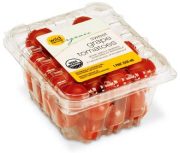
Given these nutrition facts of tomatoes, you surely can have them now knowing the good that you are doing to your body. For things like the sun dried tomatoes and canned tomatoes just be on the look out for the sodium content. It is not advised to consume things that are too high in sodium content. As we mentioned earlier, it may lead to high blood pressure, which in turn may lead to heart disease, heart failure, kidney failure, amongst many other conditions which are dtrimental to our health.


